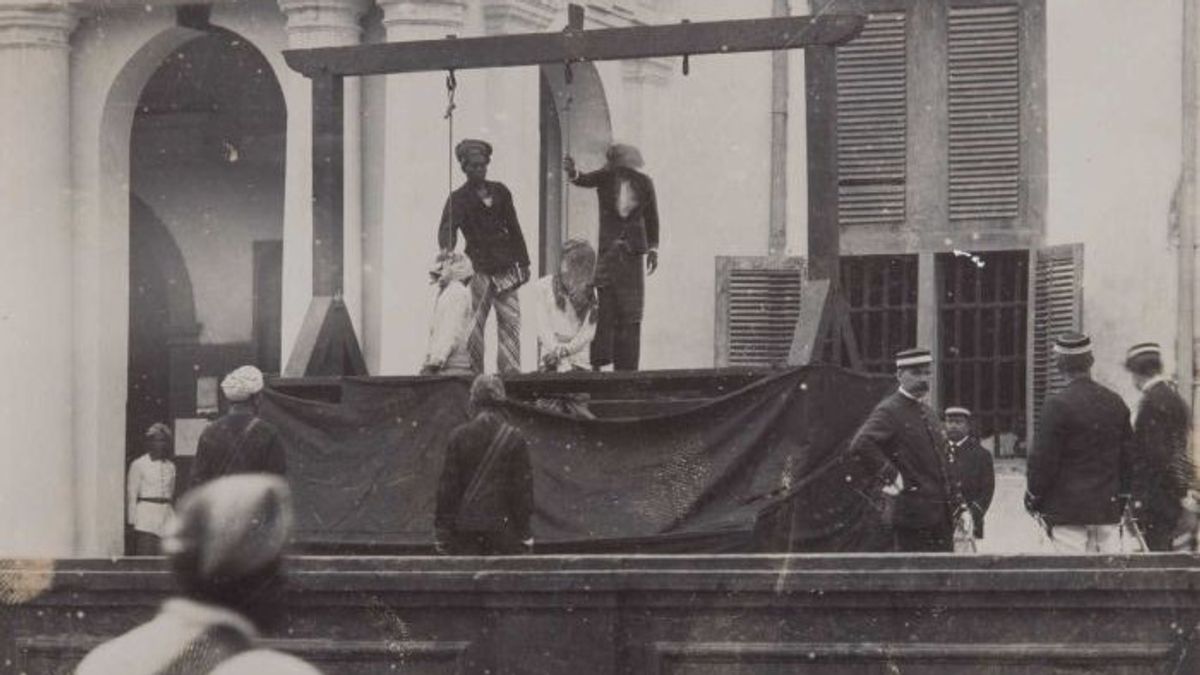JAKARTA - The legacy of the Dutch colonial period does not only leave wounds arising from forced cultivation, exploitation of spices, poverty, and other suffering of the indigenous people. The colonial period also left a number of terms that are familiar to the ears today. One of them, the masher. There is a dark tragedy behind the emergence of the term masher.
In today's world, the term masher is used to describe a male who likes to play with women. In fact, what was the origin of the term? Various literatures have noted that the term has been known since the capital city of Jakarta was still called Batavia and was headed by the famous Governor General of the Dutch East Indies, Jan Pieterszoon Coen.
In the 17th century, Batavia had become an area inhabited by white European men. However, at that time only a few women were white. For those with high ranks, it was okay to bring their wives and children from the Netherlands to the colony. However, not for lowly soldiers.
At that time the soldiers fulfilled their desire by engaging in mixed marriages, which at that time were very taboo. Apart from mixed marriages, they also practice concubinage.
However, not all of them are like that. Vaandrig (subordinate soldier) 17 years of mixed native blood - the blood of his mother - who used to guard Batavia Castle, Pieter Cortenhoeff was luckier. The young man who was born in Arakan, Myanmar, who is also the son of a Dutch trader, has a handsome face.
His beauty attracted the attention of many women at court, including Sara Specx. Sara was the child who was entrusted to Coen from his colleague Jacques Specx, who was then returning to the Netherlands.
Jaques said to Coen, “While I returned to Patria (Holland) to fulfill Heren XVII's request, I left Sara, my daughter, to you. I believe you can take care of him. "
The full story of Sara was revealed by a senior journalist, Alwi Shahab in her book entitled Robin Hood Betawi. He said, "Sara or often called by the name Saartje is the daughter of a VOC official named Jaques Specx with a Japanese mistress."
The Batavia Castle ScandalLong story short, like the romance written by Tjoa Piet Bak in a book entitled Sara Specx (Satoe Kedjadian who was betoel in Betawi at his Pamerentahannja Jan Pieterszoon Coen in 1629), Sara and Pieter have a secret love relationship behind Coen's supervision.
Initially, the relationship between the two went smoothly. Until one day, Coen's trusted people found Sara and Pieter making out in one of the fortress rooms.
Achmad Sunjayadi, in a book entitled (Not) Taboo di Nusantara, describes the incident in detail. “One night, the young couple who were romantically drunk didn't realize the consequences of their actions. The poor girl who probably just got her period was in flagrante delicto (caught red-handed) making out with her lover at Coen's house. And the case of sexual violations at Batavia Castle became a hot scandal at that time. "
Coen, who heard the information, of course immediately became angry. Moreover, his track record as a role model for European society in Batavia is tarnished. The name Coen was indeed known to be fragrant as a person who fought the bad qualities of the lecherous company. The two adulterers were punished by severe punishment on June 6, 1629.
ExecutionBoth were executed right in front of the City Hall (Stadhuisplein) courtyard in the Old City area which is now known as Taman Fatahillah. The young man was beheaded. Meanwhile the girl was punished by being dragged towards the gate of the Stadhuisplein to witness her lover's punishment.
Before being dragged away, Sara's clothes were stripped off. No one paid attention to Sara's sad screams. The executioners began to shower Coen's best friend's son with repeated lashes.
Pieter, before being beheaded, had his face crossed with charcoal by the executioner as a sign for the perpetrator of sexual immorality. After the beheading, Pieter's head rolling on the ground became a spectacle witnessed by hundreds of people. Those who then looked at the face, especially the nose, immediately issued the words "masher."
Literacy strongly suspects that this incident was the origin of the word "masher". This incident also made "masher" as a stereotype in Indonesian society to label obscene men in ancient times. Stereotypes that endure to this day.
Regarding Sara's fate, Ahmad Sunjayadi explained: Sara finally married the priest Georgius Candidius in May 1632 in Batavia. This pastor was a Christian spreader in Formosa (now Taiwan), the first pastor in the Maluku Islands, and the principal of a Latin school in Batavia. Three years later, around 1632, Sara, who had followed her husband in Formosa, died at the age of 19.
The English, Chinese, Japanese, Arabic, and French versions are automatically generated by the AI. So there may still be inaccuracies in translating, please always see Indonesian as our main language. (system supported by DigitalSiber.id)










